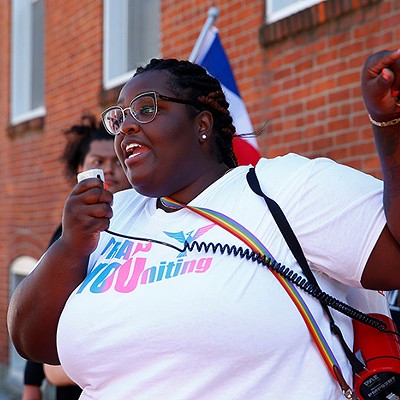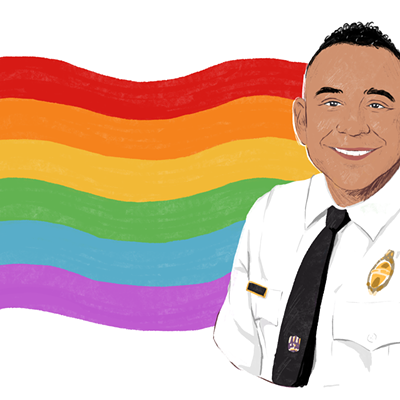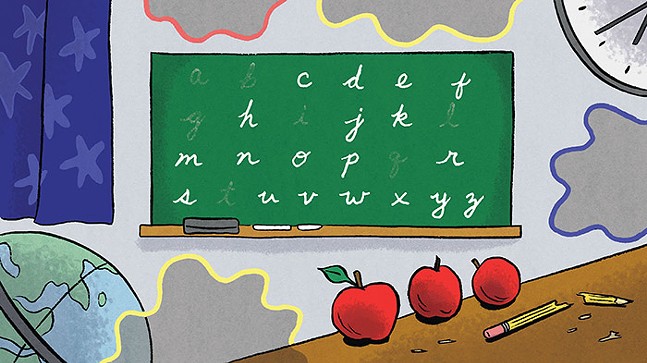
Spotlight PA is an independent, nonpartisan newsroom powered by The Philadelphia Inquirer in partnership with PennLive/The Patriot-News, TribLIVE/Pittsburgh Tribune-Review, and WITF Public Media. Sign up for our free newsletters.
HARRISBURG — As a closeted gay child growing up in Lancaster in the 1990s, J Eric Fisher didn’t feel safe. He said the existence of LGBTQIA+ people wasn’t discussed in the schools he attended.
It was a taboo topic, and because of the stigma, he and other queer people he knew didn’t come out until later in life when they felt safer.
“Students did not talk about it, I didn’t talk about it, my queer friends didn’t talk about it,” he said in an interview with Spotlight PA.
Fisher moved to New York City and began teaching in 2003 at private schools there, which even then used teaching practices that embraced differences among students. He recalls using gender-inclusive language — like “friends,” instead of “boys and girls” — and ensuring books represented students from “all kinds of families.”
In 2016, they returned to Lancaster with their husband and son, and the cultural difference was jarring. He was shocked by the amount of homophobia he witnessed in his day-to-day life. But when he asked the school he planned to send his child to how it handled discrimination, officials told him homophobia “doesn’t exist” in the school district.
In reality, many LGBTQIA+ students in Pennsylvania have experienced verbal and physical harassment as well as discriminatory school policies, according to a 2019 survey by GLSEN, an LGBTQIA+ anti-bullying advocacy nonprofit. Fisher fears the situation could become worse for students in Pennsylvania should a bill introduced by two Republican state lawmakers become law.
The legislation sponsored by state Sens. Ryan Aument and Scott Martin of Lancaster County would ban classroom instruction on gender identity and sexual orientation in kindergarten through fifth grade, claiming it’s not “age appropriate.” It also would restrict such teachings in secondary school and require staff to disclose a student’s gender identity or sexual orientation to parents without the child’s consent.
The senators have defended their bill as an effort to protect “parental rights” and say it won’t discourage classroom discussion of LGBTQIA+ topics.
“Do opponents of this bill really believe that parents should be prohibited from knowing if their child is experiencing gender identity issues?” Aument and Martin said in a statement. “Do they really believe teachers should have more of a right than parents to educate young children about issues relating to sexuality?”
Those questions contrast the concerns of several educators and mental health providers who worry the ban would teach children that being part of the LGBTQIA+ community is wrong. That kind of stigma, the president of the American Psychological Association wrote earlier this year, “can lead to depression, anxiety, self-harm, and even suicide.”
A United Nations independent expert echoed those concerns in a report in August, condemning legislative attacks on LGBTQIA+ rights by state governments as a “plague.”
“The recent wave of ‘Don’t Say Gay or Trans’ laws that passed in several states … can have the impact of endorsing exclusion, bullying, and harassment of LGBT youth in American education settings,” wrote Victor Madrigal-Borloz, an expert on violence and discrimination for the U.N.’s Human Rights Council.
“The evidence shows that, without exception, these actions rely on prejudiced and stigmatizing views of LGBT persons, in particular transgender children and youth, and seek to leverage their lives as props for political profit.”
The state Senate bill is similar to the Parental Rights in Education law enacted in Florida this summer, dubbed “Don’t Say Gay” by its critics. The law bans classroom instruction on gender identity and sexual orientation in kindergarten through third grade.
It requires schools to notify parents if there “is a change in the student’s services or monitoring related to the student’s mental, emotional, or physical health or well-being” — a confusing clause that some teachers fear means they must “out” their students.
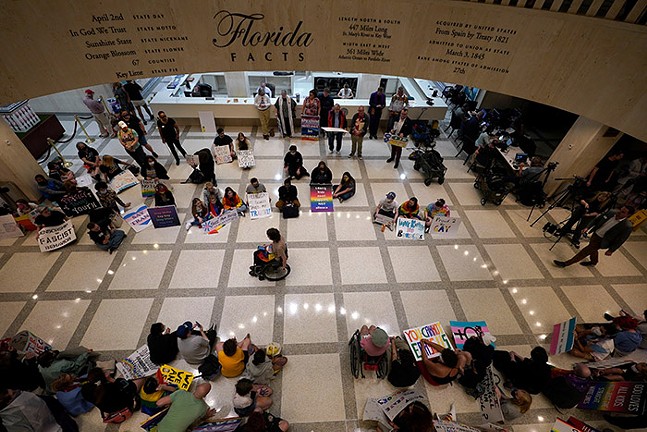
Pennsylvania’s bill, the Empowering Families in Education Act, would go further by implementing a K-5 curriculum ban and restrictions for grades 6-12.
The legislation would allow parents to sue schools that they believe are violating the law. Unlike Florida’s law, Pennsylvania’s bill would not require a parent to attempt a resolution with a school before bringing legal action. Florida’s law gives schools a chance to address parents’ concerns through a formal process before the parent can sue.
While the bill would allow for student-initiated conversations, legal groups and advocates say the threat of expensive lawsuits would deter teachers from answering student questions and schools from allowing students to discuss gender and sexual orientation.
The bill passed the state Senate 29-21 in June and awaits consideration in the state House. Should the legislation reach Gov. Tom Wolf’s desk, he has vowed to veto it because it is “discriminatory to the LGBTQ community.”
But next year, Pennsylvania will have a new governor. The Republican running for the office, state Sen. Doug Mastriano of Franklin County, voted for the bill. Democratic nominee Josh Shapiro opposes the legislation and denounces “attempts to bully LGBTQ Pennsylvanians,” according to a campaign spokesperson.
>>READ MORE: Where governor candidates Mastriano, Shapiro stand on LGBTQ rights
A “hostile school climate” can have profoundly negative impacts on LGBTQIA+ students including a lower grade point average and higher rates of absenteeism, a 2019 survey by GLSEN found. Research shows childhood bullying and trauma can lead to chronic physical and mental health problems.
“Those who survive and thrive will continue to deal with the trauma for the rest of their lives,” said Fisher, who said he’s still working through childhood incidents in therapy.
In a news release, Aument and Martin dismissed accusations that the bill would endanger children as “an extreme leap from alarmist opponents who seem to be determined to teach elementary school children about explicit and sexual topics behind their parents’ backs.”
“We’re seeing an open debate about our community and youth and the cost is insurmountable right now,” said MK Strohman, an independent consultant on LGBTQ youth mental health training and a social worker at education agency Lancaster-Lebanon Intermediate Unit 13. “The cost of open dialogue is going to be devastating.”
Strohman, who is nonbinary, said being accepted at an early age would have made a significant difference in their life.
“I felt alone for 22 years, like there was no one else like me in the world,” said Strohman. “I can’t tell you how different life would be if I had been told it would be OK to dress differently.”
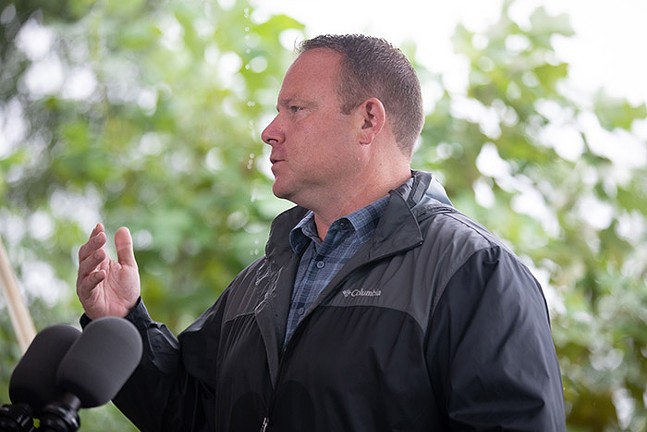
Age-appropriate education
Aument and Martin’s bill would not explicitly ban classroom instruction on LGBTQIA+ people or topics, but of “sexual orientation or gender identity.”
Critics have noted that those terms include cisgender and heterosexual relationships. But in remarks on the state Senate floor, Martin made it clear the bill was a response to parental concerns about “inappropriate conversations about sexual preferences and gender transitioning.”
Among the specific concerns cited by the senators:
- An elementary school class read books about gender after a classmate came out as transgender.
- A library displayed books with LGBTQIA+ themes.
- A middle school counselor created a private group for students to discuss gender identity without requiring parental consent.
- A middle school counselor created a private group for students to discuss gender identity without requiring parental consent.
- A middle school health teacher showed students a video explaining the chemistry behind hormone therapy.
According to the American Academy of Pediatrics, “most children have a stable sense of their gender identity” by age 4. A study of transgender children between ages 5-12 published by the journal Psychological Science found their identities were “deeply held” — they weren’t confused or pretending.
“Those kids know it,” said Strohman. “It just takes them time to develop language to communicate to someone else, but also the courage and bravery to risk saying it out loud.”
In public statements, the bill’s sponsors have reduced gender identity and sexual orientation to sexual topics. During remarks on the state Senate floor, Martin defended the proposed ban by saying sexual education doesn’t begin until 6th grade. Mastriano similarly called the legislation a “common sense way to protect minors … from sexually charged, sexually explicit conversations.”
Discussions of gender and sexual orientation are not simply “sex ed,” and equating the two is harmful to LGBTQ youth, Strohman said. Limiting curricula teaches children that being part of the LGBTQIA+ community is so inappropriate that instruction needs to be banned, they said.
“This sends a horrible message to the LGBTQ community, youth especially, that there’s something so terribly wrong with them,” Strohman said.
‘Parental rights’ v. student well-being
Aument and Martin have argued that parents rather than schools should choose when and how to discuss gender identity and sexual orientation with kids, and that these discussions should only happen when a child is “mature enough” to understand the topic.
“Our bill empowers parents to educate their own children about these sensitive topics at their own pace without having their hand forced by the public school system,” the senators said in a statement. “While we may not agree on what moral, ideological, and religious values to teach or not to teach our children, we can certainly agree that it should be up to the parent to decide — not the government.”
A memo seeking cosponsors for the bill said it would not bar students from initiating conversations with school staff about their gender identity or sexual orientation.
But if approached by a student, school staff would be required to disclose the conversation to the student’s parents, unless “documented testimony of the student or a history of documented incidents” shows doing so would result in child abuse, neglect, or abandonment.
“It is only right that a parent is not barred from being part of this kind of conversation with their child,” the senators said in the memo.
School counselors told Spotlight PA they recognize the importance of parental involvement and work with students to build their confidence and support networks to the point where they’re comfortable coming out to their families.
But the counselors fear the bill will pit their ethical obligations to prioritize the safety of the child against their legal ones.
“The goal is not to keep information from their family,” Strohman said. “It’s not good for anyone involved.”
School counselors help students navigate discussions about gender and sexual orientation with parents, but they won’t be trusted if they are forced to out students, said Emilia Peiffer, executive director of the Pennsylvania School Counselors Association.
“We don’t want to violate the trust relationship we build up with [students] by automatically telling parents what they confide in us,” Peiffer told Spotlight PA. “It will, I believe, stop students from coming to see us, to come confide in us.”
Karen Beck Pooley, a member of the Bethlehem Area School District board, was one of more than 200 people that joined 50 organizations to sign a letter opposing the legislation. She told Spotlight PA this bill and companion legislation that targets library books “run counter” to the district’s efforts to improve student well-being.
Even before the pandemic, she said the district put a lot of effort into students’ overall welfare through efforts like launching a food pantry. She said there are many other issues the General Assembly should be focusing on, like a lack of funding and support for families.
“From my vantage point, [the bill is] an attempt to earn empty political points at the expense of teachers and students,” she said.
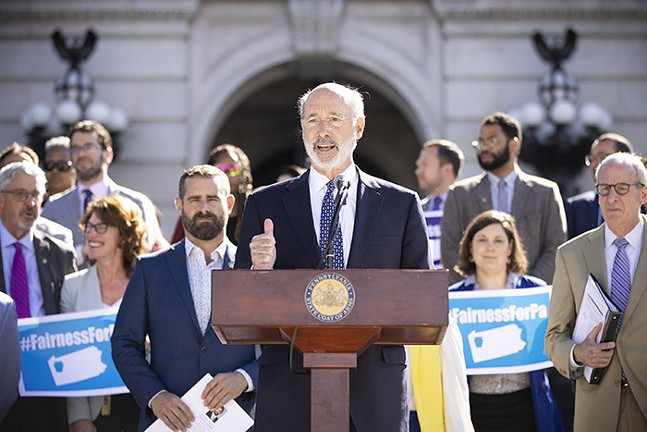
Legal questions
Legal experts from the ACLU of Pennsylvania and the Education Law Center, another legal advocacy group, say the bill would open teachers to lawsuits while also limiting students’ First Amendment rights.
The legislation would allow parents to sue school districts if they believe provisions of the law, like the ban on classroom instruction, have been violated. In comparison, Florida’s law dictates an internal process for schools to address parent concerns before they can sue.
The senators have repeatedly claimed the bill won’t impact organic conversations about gender identity or sexual orientation initiated by students.
But fear of legal action has already caused teachers and school districts in Florida to be more restrictive than the letter of the law. One Florida school district discouraged LGBTQIA+ teachers from displaying family photos of their same-sex spouses in the classroom.
Pennsylvania’s bill also would require teachers and schools to remain “neutral” and prevent “government endorsement” of views about gender identity and sexual orientation.
In a memo to the state Senate, Elizabeth Randol, legislative director of the ACLU of Pennsylvania, questioned exactly what it means to be “neutral” on gay people.
“Requiring schools, teachers, or staff adopt a position of ‘neutrality’ on sexual orientation and gender identity does not change the fact that gay, trans, and non-binary people exist,” Randol wrote. “Neutrality cannot wish the gay away.”
Advocacy groups and parents in Florida have challenged the law in courts, arguing it violates students’ rights to free speech and due process, and discriminates against the LGBTQIA+ community.
In public statements opposing the state Senate legislation, the ACLU of Pennsylvania and Education Law Center argue Pennsylvania’s bill also would run afoul of the U.S. Constitution.
“School actions that target certain speech or have the effect of stifling or discouraging identity-affirming speech or expression violate the First Amendment rights of students,” a letter released by the Education Law Center states. “Many rights and protections also apply to school teachers and staff.”
Fisher said teachers talk about their spouses and families in the classroom all the time, and the claim that those, and any other discussions including LGBTQIA+ people, are sexual in nature is patently false.
“The idea that talking about queer people, LGBTQ people, in schools equates with sex is so demoralizing and insulting and dehumanizing,” they said.
They see the bills as part of a changing political climate for LGBTQIA+ rights and believe it will become unsafe for queer and transgender people to live in Pennsylvania. If the bill becomes law, he said he may have to consider moving his family out of the state.
“The end goal here is to dehumanize us, as they’ve always done to us,” Fisher said.
WHILE YOU’RE HERE... If you learned something from this story, pay it forward and become a member of Spotlight PA so someone else can in the future at spotlightpa.org/donate. Spotlight PA is funded by foundations and readers like you who are committed to accountability journalism that gets results.





